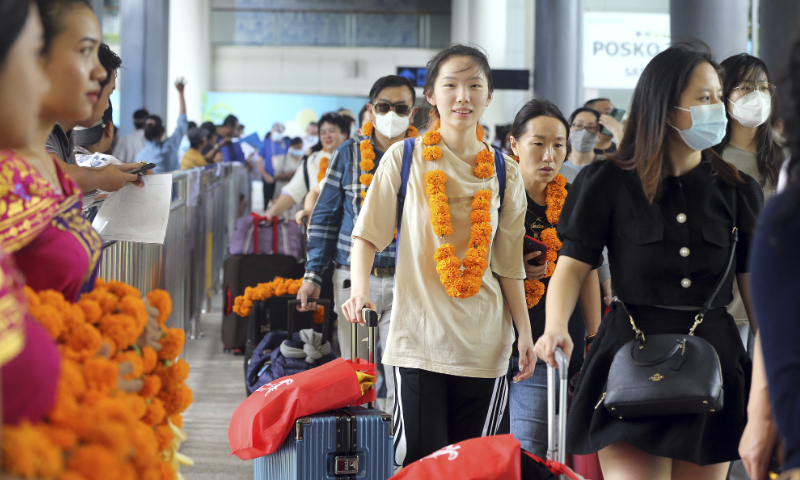
Chinese tourists arrive at Ngurah Rai International Airport in Bali, Indonesia on January 22, 2023. Photo: VCG
The International Air Transport Association (IATA) has given the thumbs up to China's optimized COVID-19 response measures, saying China's reopening and the restart of China's aviation and tourism industry will boost the aviation industry's global recovery.
The comment came after China adjusted its COVID response in light of the evolving situation. New measures include people in Chin no longer being required to take temperature checks when entering passenger terminals or taking public transport since January 8, 2023, and the country has lifted anti-COVID restrictions on international passenger flights, and optimized its regulations on travel between the mainland and Hong Kong and Macao.
"China's reopening and the restart of China's aviation and tourism industry will boost the aviation industry's recovery," Xie Xingquan, Regional Vice President of North Asia from the International Air Transport Association told the Global Times on Thursday.
An industry outlook memo announced in early December 2022 projected an aggregated profit of $4.7 billion in 2023, with passenger demand reaching 85.5 percent of the 2019 levels.
The outlook assumed that China would gradually reopen to international travel and ease domestic COVID-19 restrictions progressively from the second half of 2023. China's earlier than expected opening will have a positive effect on the industry's early recovery.
The reopening is good news for China's domestic aviation industry. It marks the beginning of the recovery process for the Chinese airlines as they re-launch flights and re-establish China's connectivity with the rest of the world, Xie added.
IATA said on Tuesday that the international passenger traffic of Asia-Pacific airlines in 2022 increased by 363.3 percent year-on-year in 2021, ranking first among all regions globally.
The International Civil Aviation Organization (ICAO) predicted on Wednesday that in the first quarter of 2023, air passenger demand on most routes around the world would recover rapidly to near pre-COVID-19 levels, and the demand will increase by about 3 percent above that of 2019 by the end of the year.
At present, there are always some unfriendly voices, such as those advocating for specific travel restrictions on Chinese tourists in some countries.
The US, Japan and South Korea are among the countries that announced restrictions on travelers from China, citing concerns that the current surge of COVID-19 cases in China could lead to the emergence of new variants.
Spokesperson from China's Ministry of Foreign Affairs has for days urged countries to base their COVID response measures on science and not to resort to political manipulation or discriminatory measures targeting China.
It was disappointing to see the knee-jerk reinstatement of COVID-19 testing and other measures solely for travelers from China by several countries in early January, especially when the virus is already circulating widely within their own borders, Xie said.
The experience of the last three years has shown that these measures are ineffective in preventing the spread of the virus. Research undertaken around the arrival of the Omicron variant concluded that putting barriers in the way of travel made no difference to the peak spread of infections. At most, restrictions delayed that peak by a few days. If a new variant emerges in any part of the world, the same situation would be expected.
That's why governments should listen to the advice of experts, including the WHO, that advise against travel restrictions, Xie added.
Today we have the tools to manage COVID-19 without resorting to ineffective measures that cut off international connectivity, damage economies and destroy jobs. Governments must base their decisions on scientific facts rather than political science, Xie noted.
China announced on January 29 that it planned to resume issuing visas to Japanese that same day, after the Japanese Embassy in China resumed visa applications for Chinese nationals, a move widely regarded as a positive sign for travel and communications between Chinese and Japanese people.
Recent moves by both China and Japan to remove some of the temporary travel restrictions are encouraging, Xie said.




